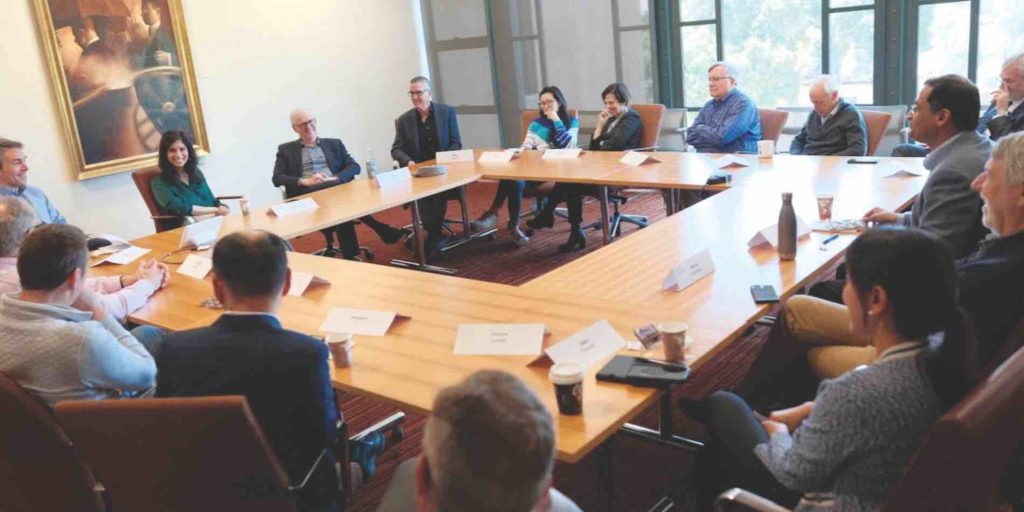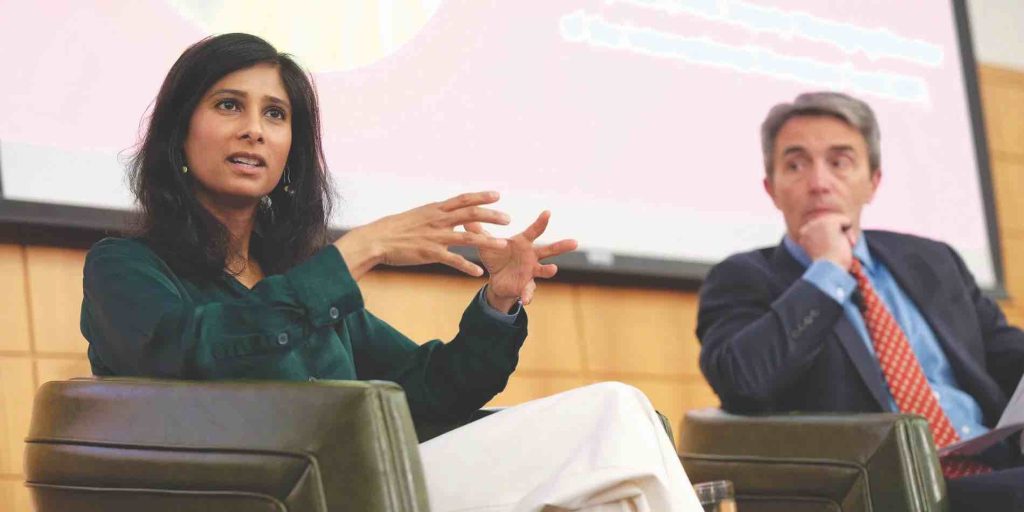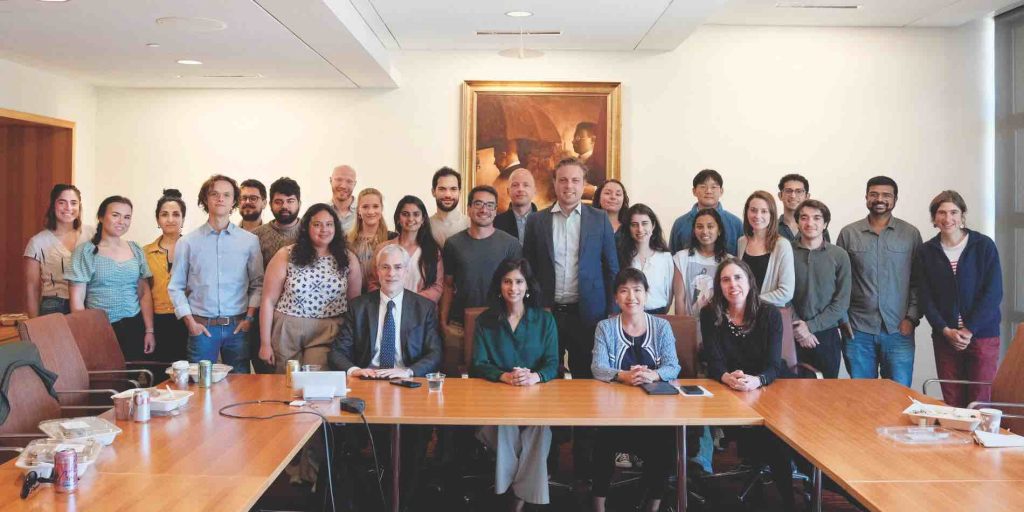June 19, 2024.
Words Evelyn Harper.
Photography Ryan Zhang.

Gita Gopinath meets with Stanford scholars who are delving into global policy issues ranging from central banks to trade.
Introduction
The Stanford Institute for Economic Policy Research hosted an illuminating discussion featuring Gita Gopinath, the first deputy managing director of the International Monetary Fund (IMF). The event, co-sponsored by the Stanford King Center on Global Development and the Hoover Institution, underscored the importance of connecting policymakers, academics, and students to delve into pressing economic policy issues. Gopinath’s talk focused on the intricate interplay between geopolitics, global trade, and the enduring dominance of the US dollar.
Geopolitical Shifts and Trade
Gopinath commenced by emphasizing the unprecedented shifts in global trade relations over recent years, driven by geopolitical considerations such as economic and national security concerns. Major events, including the COVID-19 pandemic and Russia’s invasion of Ukraine, have prompted countries to reassess their trade and investment partners. This reassessment has manifested in a surge of trade restrictions and a shift in foreign direct investment patterns.
A striking trend is the rise in trade restrictions, which tripled from 2019 to 2022-2023. Despite these restrictions, the global trade volume to GDP ratios appears flat, masking significant underlying shifts in trade dynamics. Gopinath explained that geopolitical distances, measured by countries’ political alignments, are now crucial determinants of trade flows. IMF research indicates a 12 percent reduction in trade and a 20 percent reduction in foreign direct investment between geopolitically distant countries compared to within aligned blocs.
The Role of Connector Countries
Gopinath introduced the concept of “connector countries,” which play a pivotal role in maintaining trade efficiency amidst growing geopolitical fragmentation.
Countries like Vietnam and Mexico are emerging as key intermediaries, facilitating trade between major blocs such as the US and China. This intermediary role helps mitigate the impact of geopolitical tensions on global trade, ensuring that goods continue to flow despite political rifts.
Historical Context and Future Concerns
Reflecting on the Cold War era, Gopinath noted that current trade fragmentation has not yet reached the levels observed between the Western and Eastern blocs. However, today’s global economy is far more integrated, with trade constituting 45 percent of
GDP compared to 16 percent during the Cold War. The potential cost of decoupling is significantly higher. She emphasized the importance of non-aligned countries, which now play a larger role in global supply chains, in preventing severe economic fragmentation.
Currency and Financial Markets
Gopinath discussed the continued dominance of the US dollar, which remains the primary currency for trade finance and foreign currency reserves. Despite some diversification into currencies such as the Canadian and Australian dollars and the Chinese renminbi, the dollar’s dominance persists. This dominance is underpinned by the US’s deep financial markets, full currency convertibility, and robust institutional framework.
Economic Resilience and Fragmentation
Gopinath warned that economic fragmentation could erode efficiency gains from specialization, reduce competition and knowledge diffusion, and ultimately harm global GDP. She presented IMF estimates showing potential GDP losses ranging from 0.2 percent in mild fragmentation scenarios to seven percent in severe decoupling situations. She also highlighted the disproportionate impact on emerging and developing economies, which heavily rely on global trade and investment.
Policy Recommendations
To counter the risks of fragmentation, Gopinath advocated for strengthening the rules-based global trading system. She called for reforms to the World Trade Organization (WTO), particularly in dispute resolution and rules regarding subsidies and national security. She emphasized the importance of maintaining open communication channels between major economies and seeking common ground in areas like digital services trade and climate action.
Q&A Session
Following her comprehensive remarks, Gopinath participated in an engaging Q&A session moderated by Mark Duggan. This session provided deeper insights into the IMF’s roles and policies and addressed several critical global economic issues.
IMF’s Role in the Global Economy
Duggan opened the session by asking Gopinath to elaborate on the IMF’s primary functions. Gopinath explained the three core roles of the IMF: monitoring global economic trends and providing policy advice to its 190 member countries, acting as a lender of last resort to countries in financial crises, and offering capacity development and training to help countries improve their economic management. She highlighted the IMF’s efforts in conducting bilateral and multilateral surveillance, assisting countries like Argentina and Ukraine with financing and policy advice, and supporting countries in implementing effective economic policies.
Global Economic Outlook
When asked about the current risks facing the global economy, Gopinath acknowledged that while risks are more balanced than in previous years, challenges remain. She pointed to the persistence of inflation, geopolitical conflicts, and weak medium-term growth projections as key concerns. Gopinath emphasized the need for countries to navigate the final descent of inflation carefully and the importance of addressing productivity growth to ensure sustained economic performance.
Impact of AI and Technological Advances
An intriguing question from the audience centered on the potential impact of artificial intelligence (AI) on the global economy. Gopinath acknowledged the promise of AI in boosting productivity but also cautioned that macro-level impacts would depend on various factors, including policy frameworks and resource allocation. She noted the wide range of estimates regarding AI’s potential productivity gains and stressed the importance of creating an environment that fosters technological innovation while ensuring equitable distribution of benefits.
US Economic Performance and Dollar Dominance
Another notable discussion point was the exceptional performance of the US economy compared to other major economies. Gopinath attributed this to robust fiscal policy, higher productivity growth, and significant capital inflows. She also discussed the implications of the US’s strong economic performance for global interest rates and funding costs. Despite some diversification, the US dollar remains dominant due to its deep financial markets and institutional strength.

Gita Gopinath, first deputy managing director, International Monetary Fund (IMF), discusses shifting geopolitical dynamics during a conversation with Mark Duggan, Trione Director, Stanford Institute for Economic Policy Research (SIEPR).
Ukraine Crisis and Global Impact
Addressing the economic impact of the war in Ukraine, Gopinath highlighted the severe contraction in Ukraine’s economy and the significant humanitarian and financial support provided by the IMF. She explained that the IMF’s USD 15 billion program for Ukraine played a catalytic role in securing additional international funding, totaling USD 150 billion. The war’s broader global impact included disruptions to energy and food markets, with Europe particularly affected by its reliance on Russian energy imports.
Industrial Policies and Global Trade System
Gopinath also touched on the challenges posed by industrial policies in major economies, particularly the use of subsidies for national security reasons. She emphasized the need for clearer rules and cooperation within the WTO framework to address these issues. Gopinath warned of the potential negative effects of retaliatory subsidies and the importance of maintaining a balanced approach to support innovation without distorting global trade.
Climate Change and IMF’s Role
In response to a question about the IMF’s approach to climate change, Gopinath outlined the IMF’s comprehensive climate strategy. She emphasized the macroeconomic importance of climate resilience and the IMF’s efforts to help countries design and implement effective climate policies. The IMF’s new financing instrument, with USD 41 billion available, supports countries in their climate mitigation and adaptation efforts, highlighting the institution’s commitment to addressing global environmental challenges.
Sri Lanka’s Economic Recovery
An audience member asked about the IMF’s role in helping countries recover from economic crises, specifically mentioning Sri Lanka. Gopinath detailed the IMF’s involvement in assisting Sri Lanka to navigate its financial difficulties. She highlighted the implementation of crucial economic reforms and the provision of financial assistance aimed at stabilizing the economy and fostering sustainable growth. Gopinath emphasized the importance of maintaining fiscal discipline and implementing structural reforms to ensure long-term economic stability.
Audience Engagement
The Q&A session demonstrated the audience’s keen interest in understanding the complexities of geopolitics, global trade, and economic policies. Professors and students alike posed insightful questions, prompting Gopinath to delve deeper into the IMF’s strategies and the broader implications of current economic trends. The discussion covered a wide range of topics, from the technical aspects of inflation targeting to the geopolitical dynamics shaping global trade.
Conclusion
In her closing remarks, Gopinath reiterated the importance of preserving the gains from global economic integration while building resilience against geopolitical shocks. She urged policymakers to implement guardrails that prevent excessive fragmentation and ensure that the benefits of global trade and cooperation are maintained. The event concluded with a strong sense of the critical role that international institutions like the IMF play in navigating the complex landscape of the global economy.
This comprehensive discussion provided attendees with a deeper understanding of the challenges and opportunities facing the global economy today. Gopinath’s insights highlighted the need for thoughtful and coordinated policy responses to maintain stability and promote sustainable growth in an increasingly interconnected world.

Graduate students in public policy and economics as well as predoctoral and postdoctoral research fellows at Stanford experience a special opportunity to engage with a top IMF official in their meeting with Gita Gopinath.





